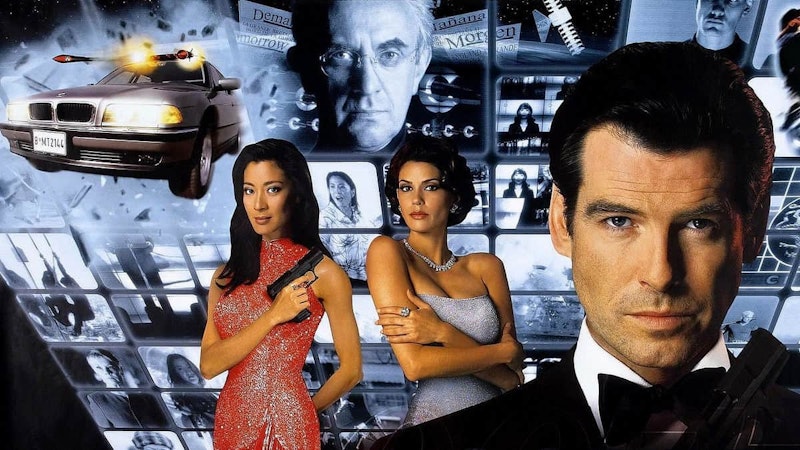After GoldenEye brought James Bond back to theaters in the form of Pierce Brosnan, 1997’s Tomorrow Never Dies had to follow up the success of a movie that was among the top-five box office successes of the year. Worse: the release date was set to coincide with a public stock offering from MGM, and couldn’t be changed. And then at the last minute the production decided to reject the original plot, revolving around the British handover of Hong Kong to the Chinese, and a new script was still being written as filming started. It’s amazing the result’s even close to coherent. In fact, these days the movie looks weirdly prescient, and may be the most underrated entry in the whole series.
After a British warship’s sunk in Chinese waters and a Chinese jet’s shot down investigating the situation, Bond’s sent to investigate media tycoon Elliot Carver (Jonathan Pryce) who released news of the conflict well before MI6 knew about it. As Britain and China lurch toward war, Bond seduces Carver’s wife (Teri Hatcher), an old flame. This leads him to a rigged GPS device that proves Carver’s up to something, and he begins alternating rivalry and alliance with Wai Lin (Michelle Yeoh), an elite Chinese secret agent also investigating Carver. It turns out that Carver’s trying to start a war to install a puppet at the top of the Chinese government, which leads to Bond and Wai Lin infiltrating Carver’s headquarters aboard a high-tech ship, and then to an explosive climax.
You can see the Bond formula at work, with particularly liberal borrowings from The Spy Who Loved Me. Treatments for the original Hong Kong plot were written in 1995 by Donald E. Westlake, but credit for the final script goes to Bruce Feirstein, though various script doctors including Nicholas Meyer worked on the film as well. It holds together, but the strong point of Bond movies has never been the tightness of the plots.
Roger Spottiswoode took over as director, and even more than Martin Campbell did in GoldenEye he builds a Bond world. Lighting and set design create a high-tech aesthetic of the 1990s comparable to the stylishness of the 1960s, thanks in large part to cinematographer Robert Elswit (taking a break from his work with Paul Thomas Anderson). It’s a very different aesthetic from the mod 1960s, with more computer screens and red lights and blue shadows, but it’s expressionistic in the same way: a low-key visual fantasia on the theme of technology. This is exactly the background that suits Bond, a world heightened beyond reality in a specific technological direction. The point isn’t to establish logical settings, but to build places that have a tone and visual identity and just enough plausibility to make a baseline amount of sense.
It’s also important to fill those settings with pulp-fiction action sequences, which Spottiswoode does with aplomb. Having Michelle Yeoh in the movie helps. There’s an especially nice sequence where she shares a motorcycle with Brosnan, suggesting somebody in the production watched the end of Supercop. She also gets a fight scene for which Jackie Chan’s stunt team had to be called in, allegedly because none of the Western stuntmen wanted anything to do with her full-contact stage-fighting style.
Here for perhaps the first time since the Connery years, the Bond franchise is at the forefront of Anglophone action films: a year before The Matrix would bring Hong Kong martial-arts cinema into the American mainstream, this movie delivers a touch of that chaos. It’s not as extensive as what The Matrix would do, not as central to the plot, but in retrospect it’s a sign of filmmakers plugged into their present moment.
Which explains why the movie holds up so well. In the same way that people claim to see the future in the random configuration of tea leaves or the fall of some tarot cards, out of the chaos of this film’s production emerge hints at a future we’re now living in. You see an evil tech bro plotting to release software full of bugs, forcing people to keep returning for upgrades. You see tension over China’s ambitions in the South China Sea. And you see a distrust of politicized media. Carver suggests his news satellites are tools for information: “"Or disinformation,” says Bond. “Say if you wanted to manipulate the course of governments. Or people…”
It’s tempting to see Carver as Rupert Murdoch, prepared to ruin a global superpower for his own enrichment, but the actual inspiration was the then-recent death of Robert Maxwell. In fact, apparently by coincidence Carver looks like Steve Jobs—and orates like Jobs, who gave his first keynote address as head of Apple in mid-1997. Again, unintentionally the movie resonates with its time and ours.
Carver works as a villain because Jonathan Pryce plays him well, smug and convinced of his own genius. Judi Dench is again a standout as M, and it’s a cute touch that the movie has Geoffrey Palmer, her castmate from the sitcom As Time Goes By, to squabble with her as a grumpy old man from the Royal Navy. Brosnan is solid as Bond but underplays the possible emotional arc of dealing with an ex-girlfriend. He’s all business, lacking the glints of something deeper that even Moore sometimes showed.
If the plot’s ramshackle, it’s good to see Bond back fighting evil billionaires. Much as the movie looks forward in ways it couldn’t have realized, it also looks backward to previous Bond films to exactly the right degree. When it came out, it did its job: it made almost as much money as GoldenEye. It doesn’t mean to make the statements it does, about media trustworthiness and the decline of British sea power, but sometimes these things slip out. It’s entertaining because the action works, but in the messiness of the film you can see odd gleams of meaning which give the movie an extra frisson.

